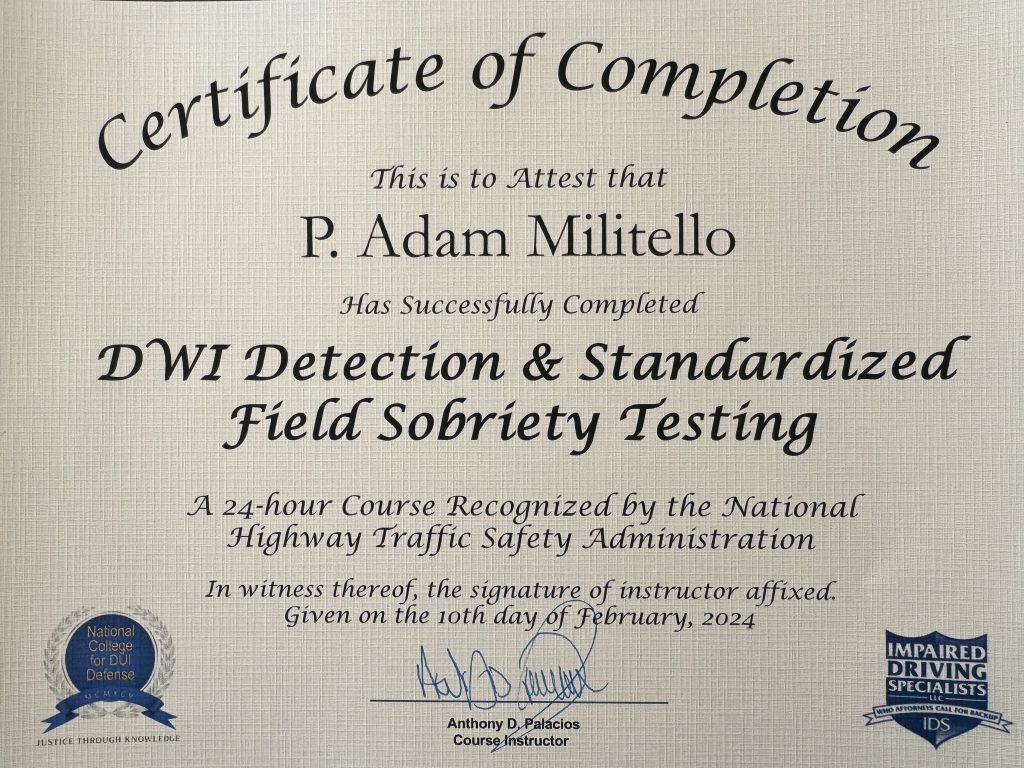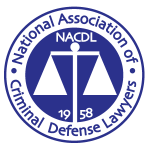“I have your back”
Field Sobriety Tests: What to Know
Whether you believe Field Sobriety Tests can detect intoxication, or whether you believe they are junk science, knowing how police use them could make or break your case. DWI Attorney P. Adam Militello, Esq. is one of the few defense lawyers in Rochester who have taken the exact same Field Sobriety Testing course as the police officers making DWI arrests.

What are Field Sobriety Tests?
Field Sobriety Tests are the psycho-motor skill tests administered by police when they think a person is under the influence of alcohol or drugs. These tests include the Horizontal Gaze Nystagmus test, the Walk & Turn, the One Leg Stand, the Finger-to-Nose test, the Alphabet test, the Modified Romberg Balance test, and a few other tests that police claim can detect intoxication or impairment of a suspect. You can accurately think of them as a game of "Simon Says." Why? Because no matter how hard you try, eventually you lose.
Field Sobriety Tests: Should I Comply and Take Them?
If you are stopped by police you should NEVER take the Field Sobriety Tests. Never - even if you are completely sober. Why?
For starters, you are not required by law to take any Field Sobriety Tests. There is no adverse consequence to your license if you politely decline to take any Field Sobriety Test, and they can only hurt you, even if you are completely sober. Why is that?
Field Sobriety Tests are deeply flawed.
While I was taking the training class on Field Sobriety Testing, I was a paired with another attorney and we would practice administering the tests on each other. We were also a part of a 6-person group who practiced the tests on alcohol-dosed volunteers so that we could practice the tests on people with varying degrees of impairment. Here is some of what I saw:
First, you should know that many of my completely sober classmates could not pass one or more of the Field Sobriety Tests. For example, very few sober people could pass the Walk & Turn. Police officers will get on the stand and say that this test (which has 10 distinct instructions and 93 potential failure points) has a 79% accuracy rate for identifying a legally intoxicated person if that person shows just 2 clues. That's right. If you do 91 things correctly on this test but show 2 clues, you'll get arrested. Let me give you an example.
Pretend it is February and you are pulled over on 490 because of speeding. The temperature is 35 degrees Fahrenheit, and it is 9:00 pm, so it is dark out. Cars and semis are flying by while the police officer gives you 10 different instructions to follow. While the officer is giving you those instructions, you are directed to stand with your arms at your side and your right foot placed heel-to-toe in front of your left foot. If you break that heel-to-toe stance while the officer is giving you instructions, that is a clue showing intoxication. As you begin to take nine heel-to-toe steps down an imaginary line, a tractor trailer flies by at 65 mph. When it happens, you pause taking steps as you feel the wind gust from the truck. That is a second clue of intoxication. It doesn't matter if you do everything else right - the cop will testify that there is a 79% chance that your BAC was .08% or higher.
When I was administering the Walk & Turn test on sober volunteers in a climate-controlled hotel conference room, almost everybody lost their balance and broke their starting stance at least once. Many lost their balance when trying to walk heel-to-toe. Sober classmates who knew exactly what kind of turn to take almost all failed to do it correctly the first time they were asked to perform. What do you think your chances are of performing this test correctly on the side of 490? I'd guess they are about zero.
Another disturbing thing I saw had to do with the Horizontal Gaze Nystagmus test. This is a test where a stimulus like a pen is passed across your line of vision and the police officer looks for involuntary jerking in your eyes. Police claim that this test has an 88% accuracy rate when identifying suspects with a BAC of .08% or more. Let me tell you what I saw.
When eight volunteers who had consumed different amounts of alcohol were tested by five groups of test administrators, there was 0% agreement between the groups on how much, if any, jerking was visible in any of the volunteers' eyes. Some groups saw six clues in the same subject as other groups who saw four or even zero clues. In my group of six test administrators we saw a person for whom we could not identify any eye jerking (we later learned his BAC was .207%), and a person for whom we saw every clue that she should fail this test (we later learned her BAC was .029%.) Another person with no medical impairments showed resting nystagmus, which law enforcement says is a sign of potential PCP use!
There was no consensus inside groups or between groups about who showed Horizontal Gaze Nystagmus. There is no way in God's name you should trust one law enforcement officer to make an arrest decision based on this test! Just a week ago I took a case to trial where body cam video clearly showed no jerking in my client's eyes. Do you know what the prosector said to the judge? "Just because you can't see it doesn't mean it wasn't there." Translation: If you take the test and there is eye jerking, prosecutors argue you are guilty. If you take the test and there is no eye jerking, the prosecutors argue that the judge is blind and you are guilty. You cannot win.
There are many more examples of deficiencies in the use of Field Sobriety Tests and interpretation of their results that are too numerous and boring to list here.

There are other serious problems with the Field Sobriety Tests, and not just in how test results come back.
There have been a number of studies by the National Highway Traffic Safety Administration to "validate" the Field Sobriety Tests. NHTSA works with law enforcement in a desperate attempt to present Field Sobriety Tests as legitimate science. Over the years, according the NHTSA, the alleged accuracy rates of the Field Sobriety Tests have steadily climbed. Is it because the tests have magically become more accurate? I don't believe in magic. Is it because new police are better than old police at administering the tests? It seems unlikely. Is the more likely answer that the "studies" are somehow flawed or worse yet - rigged? I absolutely think so.
Here is the bottom line:
If sober people in a training to administer Field Sobriety Tests cannot pass them in a hotel conference room, you aren't going to be able to pass them standing next to 490. So don't try. Politely decline every single test, every single time, no matter how much pressure police put on you. It might not stop you from being arrested, but it could stop you from being wrongfully convicted.
We have excellent client reviews, upfront pricing and an outstanding track record of winning at trial, there is no reason not to call for a free phone conversation.
If you have been arrested for a DWI or any other crime near Rochester or Geneseo, call The Militello Law Firm. We can help, and we want to hear from you. (585) 485-0025.
Militello Law Firm
2480 Browncroft Blvd.
Rochester, NY 14625
1 University Drive
Rochester, NY 14454
Phone: (585) 485-0025
Fax: (585) 286-3128




